Is Melatonin Safe For Pregnant Women?
You’ve probably considered taking melatonin supplements to help you sleep. After all, who doesn’t want to sleep better? And with such a wealth of available information about this supplement, it’s easy to get confused about whether melatonin is safe for pregnant women.
There are many benefits to taking melatonin supplements, but are they safe for pregnant women? Despite the many health benefits of melatonin, some research has shown that it can have some negative effects on the unborn child. For example, studies in rats showed that melatonin supplements reduced litter sizes and increased birth weight, but also increased infant mortality. Additionally, melatonin supplements can cause unpleasant side effects in some people, including headaches, dizziness, and drowsiness. These side effects are certainly not desirable when you are pregnant.

melatonin is a natural sleep aid
Using melatonin as a sleep aid for pregnant women is common, but it should be used with caution. The dosage used in over- the- counter preparations is generally higher than the body’s own production, and it is not always clear how much is enough. Pregnant women should discuss this issue with their healthcare providers, who can recommend a safer alternative and suggest lifestyle changes.
Inadequate sleep during pregnancy can lead to health risks for the mother and fetus. In addition to being associated with longer labor and higher risks of preeclampsia, poor sleep can also lead to psychological problems. Women with insomnia are also more likely to experience anxiety and postpartum depression. In addition, studies suggest that melatonin can reduce stress and improve pregnancy outcomes. However, there are still many questions to answer.
It may be safe for pregnant women
While melatonin may be safe for pregnant women, it’s important to talk with your healthcare provider before using it. The fetus is still developing and some drugs may increase risks to the fetus. Pregnant women should also consider other treatment options to promote good sleep. One such option is cognitive behavioral therapy. Another option is to consult with your doctor about lifestyle changes and dietary changes.
A lack of sleep during pregnancy may pose several risks to the baby and mother. Insufficient sleep during pregnancy may increase the risk of complications such as preterm labor and increased risk of mental health problems like postpartum depression. In addition, women who experience insomnia during pregnancy may have higher rates of stress and anxiety. However, melatonin during pregnancy may reduce these symptoms and help improve pregnancy outcomes. However, more studies are needed to determine if melatonin is safe for pregnant women. Also, there are ethical issues to consider.
It may have some risks
While melatonin has many benefits, it is important to be aware of possible risks when taking it during pregnancy. Pregnant women should talk to their healthcare providers before taking melatonin supplements or taking prescription drugs. These
professionals can prescribe alternatives to melatonin and suggest lifestyle changes that may help improve the quality of sleep.
Some of the risks associated with melatonin supplements for pregnant women include leg cramps, indigestion, and anxiety. The risks are generally mild and minimal. Because the melatonin supplements are not regulated by the Food and Drug Administration, there is no way to know whether they are safe for pregnant women. However, it is still recommended that pregnant women do not take over-the-counter supplements.

It may promote preterm labor
Melatonin may promote preterm labor during pregnancy in some women. It can reduce the temperature of the maternal body, which aids in the transfer of heat from the fetus to the placenta. However, the precise mechanism for melatonin’s role in the regulation of body temperature is unclear.
Researchers have previously shown that melatonin is produced in response to light. This is a natural process in animals that are seasonally reproductive, and it has been shown to suppress physiological functions during nighttime. However, the wavelength of light is important: light in the blue/green range inhibits melatonin production more than red wavelengths. This mechanism may explain why light exposure during late -term pregnancy lowers melatonin levels in pregnant women. The lower melatonin concentrations in the mother’s bloodstream is associated with fewer contractions during labor.
It may increase offspring survival
A new study suggests that taking melatonin during pregnancy can help increase the survival of offspring. The hormone, found in pineal glands, may protect against the effects of corticosteroids in the offspring. It may also reduce the effects of corticosteroids on premature infants. However, its protective effects on offspring were not well understood. The study used pregnant mice that were given daily injections of melatonin. It found that melatonin decreased the risk of exencephaly in diabetic embryos.
The study also showed that melatonin increased the survival rate of infants born prematurely. It reduced the risk of seizures and white matter damage, and decreased the risk of developmental delay at six months of age. It also increased melatonin levels in labor-associated birth, which is thought to reduce oxidative stress in the neonate.
Is Melatonin Safe For Pregnant Women? Result
If you are pregnant, you might want to hold off taking melatonin supplements until after you deliver the baby. Although they are very useful in treating insomnia and have many other benefits, the side effects and unknown risks may not be worth it for you. Keep in mind that your needs can change once you become pregnant, and this should be taken into account when choosing a sleep aid.

